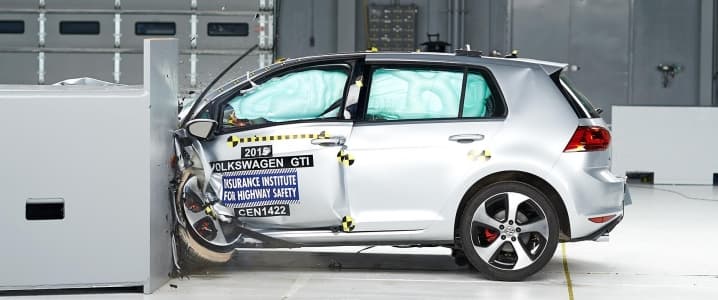Volkswagen Group (OTCMKTS:VLKAY) is feeling the vise grip tighten with accusations about its role in testing toxic diesel fumes on monkeys and humans.
The German automaker, along with BMW (OTCMKTS:BMWYY) and Daimler (OTCMKTS:DDAIF), have come under intense scrutiny since the New York Times last week reported that the companies funded an organization called European Research Group on Environment and Health in the Transport Sector (EUGT) to commission the emissions tests.
The tests were carried in 2014 with funding from Germany’s Big 3 automakers, along with auto suppliers. The tests were alleged to be gathering evidence to discredit claims about diesel fumes causing cancer.
Volkswagen Group CEO Matthias Mueller called the tests "unethical and repulsive.” Soon thereafter, the automaker accepted a letter of resignation from its chief lobbyist Thomas Steg for his involvement in the scandal.
Steg was in charge of the EUGT and had prior knowledge of the monkey experiment, but didn’t attempt to stop them, a senior VW executive told Reuters on Tuesday.
A spokesman for the German automaker said the supervisory board’s executive committee will meet next week to discuss the internal investigations and ensure that no similar incidents occur again.
The study has remained elusive, with Reuters unable to confirm details and the purpose of the study and the EUGT organization. EUGT was dissolved last year.
BMW and Daimler also denounced the tests, but VW has taken most of the heat. Along with its chief lobbyist playing a leading role in the EUGT’s activities, VW shouldered most of the blame for the diesel emissions cheating scandal since the story broke in 2015. Related: Can The Shale Boom Avoid These Bottlenecks?
German automakers were concerned about the alarms being sounded over diesel vehicles long before “Dieselgate” started. That scandal began in September 2015 when the U.S. Environmental Protection Agency filed charges against VW for equipping its model year 2009 to 2016 diesel cars with “defeat devices.” The automaker used computer software designed to be elusive during federal emissions tests.
VW and its competitors enjoyed strong sales of diesel vehicles in the U.S. and Europe for several years. VW led the diesel car sales rankings through the Audi and Volkswagen brands equipped with turbo direct injection (TDI) engines, known for providing strong performance and excellent fuel economy.
VW’s home country loved diesel vehicles for many years, since way back when diesel engines were invented German engineer Rudolph Diesel.
For years, diesel engines were thought to be superior in performance to gasoline engines and better in fuel efficiency. Following the Kyoto Protocol in 1997, European automakers supported diesel vehicles as a way to meet carbon reduction targets. The argument was that diesel engines emitted less CO2 than gasoline engines.
In the 2012, the World Health Organization submitted a research report stating that diesel fumes cause cancer. That comes from diesel having higher levels of nitrogen oxides and particulates.
Until the Dieselgate scandal struck in late 2015, news of the health hazard didn’t really affect car buyers’ decisions. Diesel shot up from 13% of market share in Western Europe in 1990 to over half the passenger cars sold prior to the scandal breaking 15 years later.
The shocking news over experimentation on monkeys and humans came right after
Germany’s KBA automotive watchdog accused Audi of continuing to manufacture vehicles with illicit emissions controls. KBA ordered a recall of 127,000 Audi vehicles, which include the latest Euro-6 diesel models.
Audi said in a statement last week that the models were included in a voluntary recall of 850,000 diesel vehicles with V6 and V8 TDI engines announced in July 2017.
The car company definitely feels the pressure. This week, German prosecutors searched the homes of several current and former Audi employees in connection with the diesel emissions cheating scandal.
A year after the Dieselgate scandal broke, VW unveiled an ambitious plan at the Paris Motor Show: bringing electric vehicles up to 25% of its total sales by 2025. They kicked it off with what they deemed their “revolutionary” ID concept car, which they debuted at the auto show. Related: Goldman: Oil To Top $80 Within Six Months
The German automaker faces fierce competition, as Tesla, BYD, BMW, Daimler, and Nissan take the global lead in the electric vehicle race.
VW recovered enough from the legendary emissions scandal to take the top spot in global new vehicle sales away from Toyota during 2016. That title was handed over this week with news that Renault-Nissan-Mitsubishi Alliance had taken the title away from VW.
The pressure is on for VW to restore its image and lead the way in selling vehicles, whether it be EVs or models powered by internal combustion engines. To get back on track, VW’s product pipeline may include diesel vehicles in some markets, efficient gasoline engines, and electrified cars, trucks, and buses.
Competitors have taken advantage of VW and other makers of diesel-powered vehicles being sidelined by investigations and regulatory pressure in the U.S. and Europe. The Ford Transit Diesel, Chevrolet Colorado Diesel, and the Ram Pickup Diesel were the top selling diesel passenger vehicles in the U.S. last year. Buyers find their power and performance to be worth the investment.
By Jon LeSage for Oilprice.com
More Top Reads From Oilprice.com:
- Oil Prices Fall After Strong Crude Inventory Build
- Big Oil Enters Growth Mode
- Aramco IPO Delay Fears Are All Hype

















